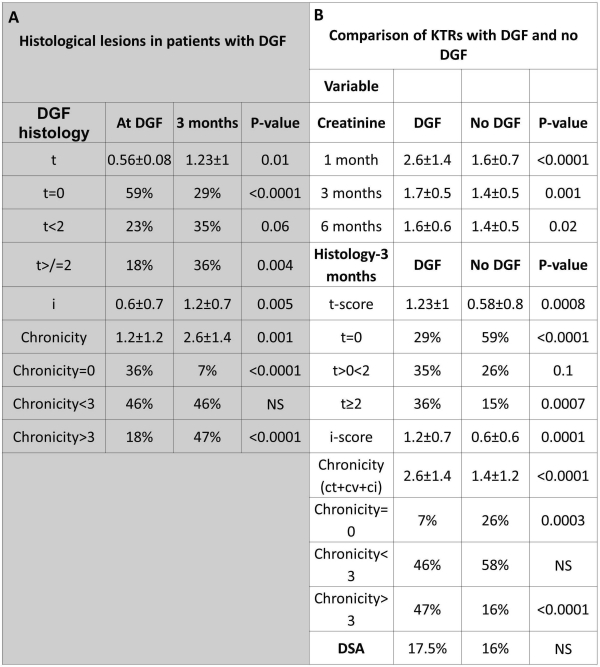Delayed Graft Function (DGF) in Kidney Transplant Recipients (KTRs) Is Associated With Early Allograft Inflammation and Progressive Fibrosis Within 3 Months
University of Pittsburgh, Pittsburgh.
Meeting: 2015 American Transplant Congress
Abstract number: A35
Keywords: Graft function, Inflammation, Rejection
Session Information
Session Name: Poster Session A: Delayed Function/Acute Injury/Outcomes/Glomerulonephritis
Session Type: Poster Session
Date: Saturday, May 2, 2015
Session Time: 5:30pm-7:30pm
 Presentation Time: 5:30pm-7:30pm
Presentation Time: 5:30pm-7:30pm
Location: Exhibit Hall E
DGF had been shown to be deleterious to KTR outcomes. Analysis of histological progression in KTRs with DGF was previously not attempted. In this prospective longitudinal study, we classified histological lesions in KTRs with DGF and Banff scores at 3m protocol biopsy. Further we compared the Banff scores and renal function at 3m between KTRs with and without DGF (Thymoglobulin; MPA, FK506 & rapid steroid withdrawal).
Of the 318 KTRs prospectively analysed, 57 (18%) had DGF. Demographics with and without DGF were comparable. Renal biopsies were done in 22 KTRs (39%) with DGF > 14days. Fig-1A shows significant proportion of KTRs with DGF had either higher acute 't' or i-scores. 18% with prolonged DGF had a t-score>2 with low cumulative chronicity scores (ct+ci+cv). Protocol biopsy at 3m in pts with DGF showed higher mean t-score with significantly higher proportion with t-score>2, suggesting progressive or persisting tubular inflammation. Similar trends were noted with i-score.
Protocol biopsy at 3m for KTRs with DGF showed significant chronic allograft damage. Approximately 50% of these patients showed a cumulative chronicity score≥3. In comparison, patients without DGF had significantly lower degrees of acute (t and i) and chronic (c) scores at 3m protocol biopsy (fig1B).

In terms of renal function KTRs with DGF had significantly worse creatinine at 1, 3 and 6m post-transplantation as opposed to those without DGF. The trends were similar when the analysis was stratified by the allografts with LD and DD transplants.
This study demonstrates 1) higher degree of acute allograft inflammation in pts with DGF>14 days despite depleting antibody therapy, 2) persistence of acute tubulointerstitial inflammation with DGF at 3m protocol biopsy 3) significant chronic allograft histological changes at 3m in KTRs with DGF vs.no DGF and 4) progression towards chronicity at 3m compared to biopsy at 14 days. This study shows that persistent allograft inflammation with progression to chronicity as early as 3m post-transplant could potentially explain the adverse clinical outcomes in KTRs with DGF.
To cite this abstract in AMA style:
Cherukuri A, Mehta R, Sood P, Chen S, Mour G, Tevar A, Randhava P, Hariharan S. Delayed Graft Function (DGF) in Kidney Transplant Recipients (KTRs) Is Associated With Early Allograft Inflammation and Progressive Fibrosis Within 3 Months [abstract]. Am J Transplant. 2015; 15 (suppl 3). https://atcmeetingabstracts.com/abstract/delayed-graft-function-dgf-in-kidney-transplant-recipients-ktrs-is-associated-with-early-allograft-inflammation-and-progressive-fibrosis-within-3-months/. Accessed February 16, 2026.« Back to 2015 American Transplant Congress
